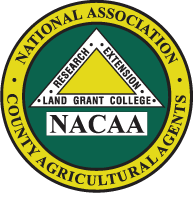Journal of the NACAA
ISSN 2158-9429
Volume 9, Issue 2 - December, 2016
A Model for Professional Development: Annie’s Project National Educator Conferences
- Schultz, M.M., Program Manager, Women In Agriculture, Iowa State University Extension And Outreach
Anderson, M.J. , Research Scientist, Research Institute for Studies in Education, Iowa State University
ABSTRACT
Women are an important audience for extension educators because their success contributes to more sustainable agricultural systems. Annie's Project is a well-established program educators use to teach farm and ranch women to make good business management decisions. A literature review suggests designing professional development around a program of mutual benefit can be effective. With this in mind, two national conferences using Annie's Project as a central program were offered to educators serving farm and ranch women. The results of follow-up surveys provide evidence of the effectiveness of the conferences. Surveys indicated 98% of respondents rated the overall professional development as 'excellent' (61%) or 'above average' (37%.) Aspects of this model for professional development may be applied to other training programs.
Introduction
Nearly one in three (30%) farmers in the United States is a woman according to the 2012 Census of Agriculture (USDA, 2014.) Yet, these women are not well served by traditional extension programs. Educating women to better manage farm and ranch business risks can have a major impact on sustainable agricultural systems. There is a need to provide professional development to help more educators offer higher quality programs to this audience of learners.
Annie’s Project is a well-established program for educating farm and ranch women. Participants learn decision-making skills related to finance, human resources, legal, marketing and production topics.
Research on professional development shows that bringing a diverse group of educators together around a program of mutual benefit is an effective method. With this in mind, two professional development conferences featuring Annie’s Project as a central program were offered to educators interested in serving the audience of farm and ranch women.
The Annie’s Project national leadership team designed the conferences to include tours, presentations, video storytelling, producer and expert panels, and group discussions. Professional development methods discovered through a literature review and personal experience were incorporated into the conference agendas.
The Research Institute for Studies in Education at Iowa State University designed and conducted an independent evaluation of the professional development conferences. There were 112 attendees from 26 states who attended one or both of the conferences. Of these, 57 completed follow-up surveys. The survey results provide evidence of the effectiveness of the professional development conferences. Conference participants explored effective educational programs for farm and ranch women and developed networks and skills to improve career success.
Annie’s Project as a Program of Mutual Benefit
Annie’s Project is the agricultural business education program that empowers farm and ranch women who want to be even more knowledgeable about their agricultural enterprises. Annie’s Project creates a comfortable and supportive learning environment focused on the best farm business management practices.
The Annie’s Project course was first developed and taught by Ruth Hambleton, retired University of Illinois Extension Educator of Farm Business Management and Marketing. Since the beginning of the program in 2003, more than 12,000 farm and ranch women in 38 states participated in Annie’s Project courses.
The Annie’s Project methods and curricula create an effective educational program for farm and ranch women. Trained extension or other educators facilitate the courses which are typically offered as local, small-group, multi-session, 18-hour classes. The Annie’s Project core values are safe harbor, connection, discovery, and shared experience.
The Annie’s Project key principles shown below guide educators in course delivery.
- Teach agricultural business management in each of the key risk areas of finance, human resources, legal, marketing, and production.
- Invite local women service providers to serve as guest speakers where possible.
- Allocate half of class time to discussion and hands-on activities.
- Provide unbiased researched-based information.
- Create a learning environment where mentoring is spontaneous.
Multi-state groups of extension educators developed additional courses for women in the tradition of Annie’s Project including Managing for Today and Tomorrow, a farm and ranch transition planning course; and Moving Beyond the Basics, a farm and ranch financial tools course. Extension educators also adapted Annie’s Project to emphasize topics such as rangeland management for western livestock producers or business planning for eastern value-added and start-up producers.
As evidence of the mutual benefit of the Annie’s Project program, Carleo et al. (2012) describe New Jersey’s business planning adaptation. Survey results indicated 57% of 137 participants in six Annie’s Project courses completed business plans and 100% completed components of a business plan. Similarly, Blazek et al. (2015) reviewed Wisconsin’s small farm and value-added adaptation. Women not only learned new skills, but survey results also indicated 85% of the 23 participants in the Wisconsin Annie’s Project course felt it was very important to offer programs especially designed for women in agriculture. In addition, Schultz et al. (2015) reported the survey results of 237 women who completed one of 24 Managing for Today and Tomorrow courses in ten states. Results of the pre-course and post-course surveys indicated statistically significant knowledge gains on all topics; as well as important actions taken during the 15-hour courses.
Educator training and program development is managed by Annie’s Project – Education for Farm Women (a non-profit organization.) To learn more about Annie’s Project, please visit the website at www.anniesproject.org. (Figure 1).

Figure 1. The mission of Annie’s Project is to empower farm and ranch women to be better business partners through networks and by managing and organizing critical information.
Research on Extension Professional Development
One study in the Journal of Extension looked closely at the current state of professional development practices of youth-serving organizations (Garst et al., 2014). Several lessons-learned are relevant to developing skills in educators who serve farm and ranch women. The authors reviewed the human resource and business literature. They documented increased innovation, improved work outcomes, improved ethics and professionalism, skill development, improved teamwork, increased networks, and adaptation to changing environments as impacts of employee professional development. The authors assert, “In an era of increasing expectations, competing priorities, and limited resources, meeting the professional development needs of Extension professionals is paramount.”
Garst et al. (2014) state that bringing educators together who share similar goals but are from across organizations and states makes for strong professional developmental programs. The authors also stated that linking promising programs of mutual benefit with the professional development helps establish relationships and provide effective models.
The authors shared the following five elements of professional development that lead to effective program implementation.
1. Present background information, theory, philosophy, and values of the program or practice to staff.
2. Introduce and demonstrate important aspects of the new practice or skill.
3. Provide opportunities to practice new skills and receive feedback.
4. Provide ongoing support and follow-up training.
5. Allow sufficient time for training.
Garst et al. conclude, “Extension program quality depends on properly prepared staff. For many educators, professional development may be the single most accessible means for developing new knowledge, skills, and practices needed to provide high-quality programs.”
Another study looked at the motivations for professional development using a career stage model. Rennekamp and Nall (1994) identified four career stages many extension professionals move through in their development: 1) entry stage, 2) colleague stage, 3) counselor stage, and 4) advisor stage.
Motivators for professional development in the entry stage include building relationships with professional peers and attaining base-level skills. At the colleague stage, professionals are motivated by developing a professional identity and expanding creativity and innovation. Those in the counselor stage are motivated by attaining leadership positions in professional circles and acquiring broad-based expertise. Motivators for professional development in the advisor stage include engaging in innovation and risk-taking and widely supporting programs and people.
Rennekamp and Nall encourage professionals to identify their career stage and articulate both short-term and long-term professional development goals in order to improve career success. The authors conclude, “We believe that by supporting staff members in professional growth we improve job performance as well as increase levels of personal satisfaction.”
Methods
Model for Professional Development
With these studies and personal experiences in mind, the Annie’s Project national leadership team developed two professional development conferences for educators interested in serving farm and ranch women.
The primary goals of the conferences are listed below.
1. Present background on Annie’s Project and demonstrate core values and key principles.
2. Meet educator needs for better program planning processes and greater subject matter expertise.
3. Guide exploration of available curricula, past evaluations, and peer experiences.
4. Build professional networks and provide on-going educator support.
5. Encourage delivery of programs for farm and ranch women.
The National Annie’s Project Educator Professional Development Conferences were held July 8-10, 2014 and September 23-24, 2015 at Iowa State University in Ames, Iowa. The 2014 conference was two and one-half days, providing 17.5 hours of classroom training plus four tours. The 2015 conference was one and one-half days, providing 10 hours of classroom training plus two tours.
The 2014 conference featured Annie’s Project as the program of mutual benefit, but also offered breakout tracts in which participants could learn about one of three different curricula: 1) Annie’s Project curriculum on all five areas of risk management, 2) Managing for Today and Tomorrow curriculum on farm and ranch transition planning, or 3) Moving Beyond the Basics curriculum on financial management. The 2014 conference included one day that was devoted to needs assessment and program improvement allowing participants to work together and practice skills. This conference featured tours of ISU Dining Services (Farm to Fork local food program), Bio Century Research Farm (bio-mass production and processing), Reiman Gardens (horticulture demonstrations), and Iowa State University Campus (Morrill Hall and Meat Processing Lab).
Due to requests for a shorter time-frame, the 2015 conference did not utilize breakout tracks, but rather focused on Annie’s Project curriculum. Other curricula for farm and ranch women were discussed briefly. The conference included tours of the Iowa State University Farm House Museum (early Extension work), and the Iowa State University Dairy Farm (industry research) and Composting Facility (sustainable recycling of animal and plant materials).
Both conferences used multiple methods of training. Personal and video storytelling, speaker/slide presentations, farmer and expert panels, tours, and small group work provided a rich learning experience. Opportunities were built into the agendas for networking, hands-on activities, and discussion among participants and trainers.
Several expert presenters were drawn from the registrants. They were invited to help train on topics they had experience with in an effort to appeal to educators in various career stages and demonstrate informal mentoring. Panels of farm and ranch women as well as farm and ranch women conference participants allowed educators to interact with and better understand the target audience.
The conferences trained participants on the program planning processes as identified below.
- Needs assessment.
- Curricula development.
- Program development including scheduling, funding and marketing.
- Course implementation including selection of guest speakers and classroom management.
- Evaluation and reporting.
The tours were designed to encourage networking and personal relationships as well as build agricultural subject matter expertise. Information on sustainable agriculture and farm and ranch risk management topics were highlighted at each conference to build expertise on these important topics.
Conference invitations were extended to a diverse mix of agriculture, human sciences and other Extension professionals, USDA and agricultural industry professionals, farm and ranch women, university students, and individuals from non-profit organizations. Bringing this diverse group from across the country together allowed participants to recognize the breadth of women in ag programming and diversity of the educators involved (Figure 2).
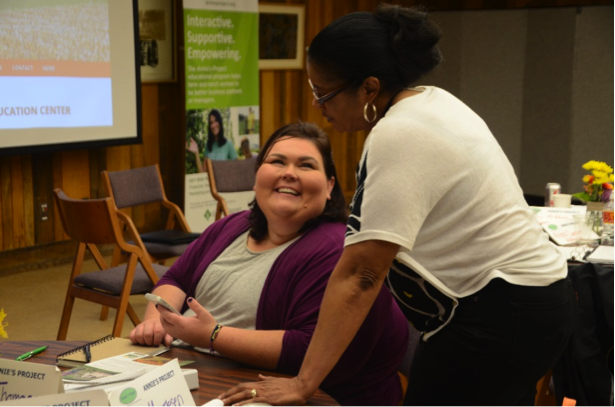
Figure 2. An extension educator from Michigan and an educator from the Georgia-based United Farmers USA (npo) share programming ideas during the professional development conference.
The primary sponsor of the conferences was North Central Sustainable Agriculture Research and Education (SARE) Professional Development Program. Additional sponsors and partners were Farm Credit System, Annie’s Project – Education for Farm Women, and Iowa State University. To review the conference agendas, please visit www.extension.iastate.edu/womeninag and look under the ‘For Educators’ tab.
Evaluation Methods
The conference organizers collaborated with Dr. Mandi Anderson, Research Scientist at the Research Institute for Studies in Education (RISE) at Iowa State University to design and conduct an independent evaluation of the conferences. A survey instrument was developed using Qualtrics (TM) online survey software. The survey used a four-point scale to eliminate middle or average answers and asked open ended questions to collect greater insights. Following the conferences, educators were emailed the survey link. The same instrument was used each year in order to aggregate the data. The survey asked participants how prepared they felt to deliver courses for farm and ranch women, as well as how well the conference helped them meet individual programming goals, enhance networks, and learn about risk management and agricultural sustainability. Questions were asked about their interest in resources, tools and on-going support. The results were analyzed and reported to the Annie’s Project national leadership team, with no personal identifiers. Two years of evaluation data are summarized in this article.
Results
Conference and Survey Participants
There were 112 conference attendees from 26 states: 54 attendees in 2014 and 58 attendees in 2015. Since some attendees participated in both conferences, there was a total of 92 unique attendees. About 60% of participants were from the North Central SARE states of Iowa, Illinois, Michigan, Minnesota, Missouri, North Dakota, Nebraska, Ohio, South Dakota, and Wisconsin. About 40% of participants were from states outside the North Central SARE region: Alabama, Arkansas, Colorado, Florida, Georgia, Louisiana, Maryland, Mississippi, New Hampshire, New Jersey, New York, Oklahoma, Pennsylvania, South Carolina, Texas, and Wyoming.
The majority of participants (67%) were from university extension systems. The mix of attendees included the following.
- Farm Credit System educators and partners (10%)
- Farm and ranch women (9%)
- USDA staff - RMA, RME, FSA, NRCS (7%)
- Non-profit organization leaders (5%)
- Iowa State University students (2%)
Of these conference participants, 32 completed follow-up surveys in 2014 and 25 completed follow-up surveys in 2015. Combined, 57 surveys are analyzed and reported together in this article.
Survey respondents represented every career stage. Surveys indicated 9% of respondents were first year educators (entry stage,) 48% had 2-10 years of experience (entry to colleague stages), 22% had 11- 20 years of experience (colleague to counselor stages), and 21% had 21- 40 years of experience (counselor to advisor stages.)
Overall Quality of the Professional Development
For a grouping of eight questions about the quality of the conference, the mean was 3.5 on a 4.0 scale. Scoring categories included poor (1), below average (2), above average (3), and excellent (4). Surveys indicated 98% of respondents rated the overall quality of the professional development as ‘above average’ (37%) or ‘excellent’ (61%).
How Well Professional Development Met Educator Needs
Respondents indicated how well the professional development provided them with opportunities to meet programming goals, enhance professional networks, and increase understanding of risk management and agricultural sustainability subject matters. The scoring categories included none, a little, some, and a great deal. Surveys indicated 95% of respondents think Annie’s Project will provide them with ‘a great deal’ (59%) or ‘some’ (36%) opportunities to meet programming goals (Figure 3.)
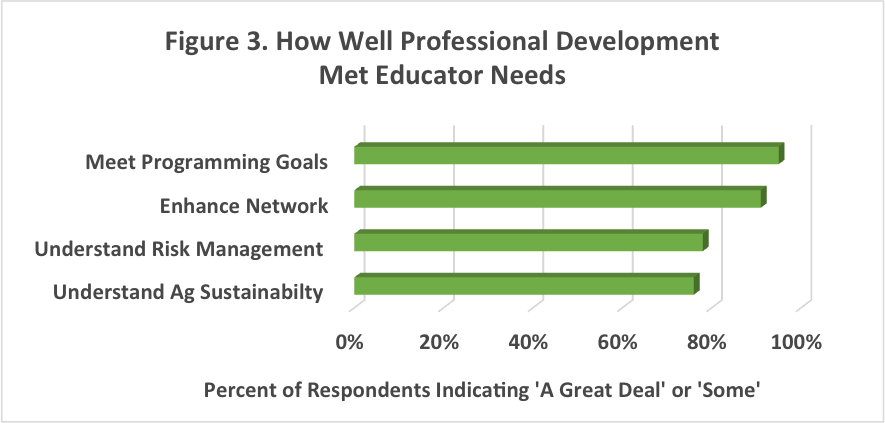
Respondents offered these explanations:
- “Annie’s Project is the keystone of my educational program. It is essential and helps support the other programs I offer.”
- “It helped me see the bigger picture on how sustainability encompasses nearly every management decision that farmers/ranchers make on a daily basis.”
Preparedness to Offer Annie’s Project and Similar Courses
Survey respondents indicated how well the conference prepared them to deliver Annie’s Project, Managing for Today and Tomorrow, and Moving Beyond the Basics courses designed for farm and ranch women. The scoring categories were ‘not prepared', ‘somewhat prepared', ‘prepared', and ‘well-prepared'. There were 80% of respondents who said they felt 'well prepared' (33%) or 'prepared' (47%).
Respondents offered these explanations:
- “Every time I attend an Annie’s Project professional development opportunity, I feel more connected with the program and better able to facilitate it. I really enjoyed the Annie’s traditions session. The panel with [the farmers], my gosh that was so powerful.”
- “I was unsure of how the Managing for Today and Tomorrow curriculum went and I learned a lot and feel comfortable offering this program.”
Plans for Accessing On-going Support
Survey respondents indicated whether they plan to access Annie’s Project resources and on-going support. Most selected ‘yes", they plan to access newsletters (91%), additional national or regional meetings (74%), teleconferences (66%), and educator contact lists (64%; Figure 4).
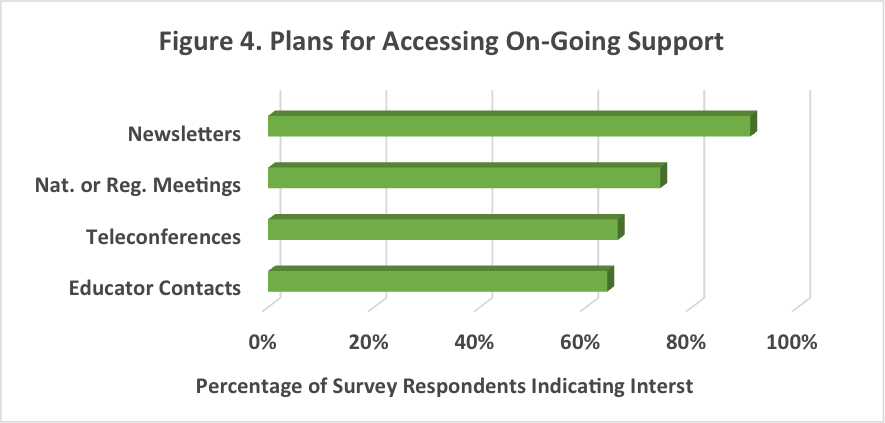
Survey respondents offered these explanations:
- “Since the meeting, I have become more aware of additional outreach resources and ways to connect and learn from other educators.”
- “The discussion with peers throughout the conference was very helpful and encouraging.”
In addition, survey respondents were well informed of the Annie’s Project websites: 95% selected ‘yes,’ they are aware of available online resources for the public and for educators. When rating the educator website, 84% found it ‘very useful’ (57%) or ‘useful’ (27%); other scoring categories were ‘somewhat useful’ and ‘not useful.’
Nearly three-fourths of survey respondents are willing to increase interaction with their peers by sharing state results or impact reports with others (72%,) and helping with future train-the-trainer programs (68%). About one-half were willing to collaborate on grant projects with one or more states (48%) and participate in online social networks (46%). Roughly one-third of survey respondents indicated a willingness to present a webinar (36%), be part of a national evaluation team (34%), write newsletter articles (32%), be part of a national course development team (30%), develop website content (30%), serve on a national leadership team (28%), or be part of a national communications and marketing team (18%).
Plans for Programming in the Next 18 Months
Survey respondents indicated how many courses they planned to offer for farm and ranch women in the next 18-months. Respondents intended to offer 82 Annie’s Project courses, 26 Managing for Today and Tomorrow courses, 16 Moving Beyond the Basics courses, and 75 other conferences, courses, webinars, workshops or tours for farm and ranch women (Figure 5).
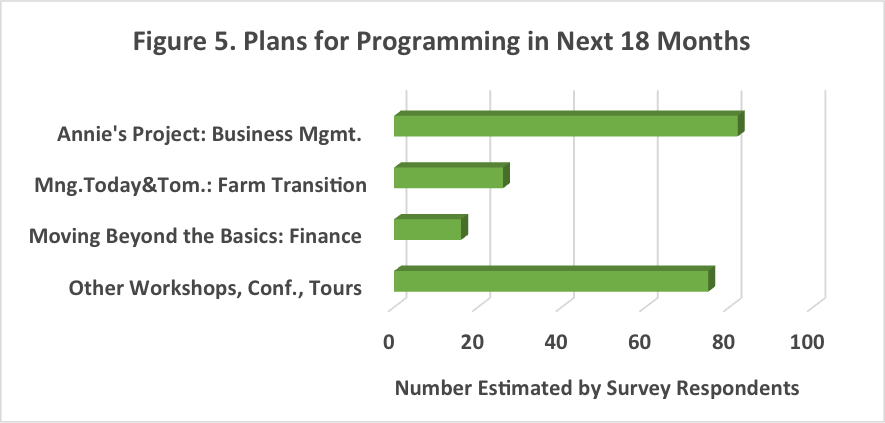
As for target audiences, respondents checked all they plan to serve: 91% plan to serve farm and ranch women, 76% plan to serve small farmers and ranchers, 76% plan to serve beginning farmers and ranchers, 44% plan to serve socially disadvantaged/minority farmers and ranchers, and 41% plan to serve limited resource farmers and ranchers.
To review the survey instrument and full data report, please visit www.extension.iastate.edu/womeninag ("For Edcators" tab).
Discussion and Application of Model
The survey results provide evidence that the Annie’s Project model for professional development is effective in preparing educators to teach farm and ranch women skills for managing their businesses. Surveys indicated 98% of respondents rated the overall quality of the professional development as ‘excellent’ (61%) or ‘above average’ (37%.) Conference participants explored effective educational programs for farm and ranch women and developed networks and skills to improve career success.
The survey results offer insights that lead to recommendations on how aspects of the Annie’s Project model for professional development may be applied to other training programs.
Bring Together a Diverse Audience to Spark Career Aspirations
The conferences included specific agenda items designed to stimulate career planning. Trainers demonstrated a best education practice used in Annie’s Project courses for farm and ranch women by asking experienced participants to not only be learners, but to also become mentors by serving as panelists and discussion leaders. Through their open-ended explanations, survey respondents described several of the motivational tenants Rennekamp and Nell (1994) described for each career stage. While the career stages are loosely defined, respondents commented on specific factors that indicated their current or desired career stage. Respondents describing base-level skill development of program planning processes and peer-to-peer relationships may identify most closely with the entry to colleague stages. Others commenting on innovative program adaptations for specific target audiences or local leadership may identify with the colleague stage. Respondents writing about county and state program coordination or deep expertise in areas such as evaluation or curricula development may identify with the counselor stage. Still others writing about broad leadership and starting new programs may identify with the advisor stage.
Design Professional Development Around a Program of Mutual Benefit
Survey results indicate that designing professional development around a program of mutual benefit is an effective strategy, as Garst et al.(2014) suggested. Sharing the well-established Annie’s Project curriculum and two new curricula, Managing for Today and Tomorrow and Moving Beyond the Basics, helped solidify training concepts. Learning about the Annie’s Project history and practicing program values made it easier for educators to understand the learning preferences of women and topics of importance to them. Discussion on how the program planning processes are implemented in Annie’s Project courses made them seem more achievable. Incorporating risk management and sustainable agriculture topics throughout the classroom and tour training activities improved educator understanding of these important subject matters. Through small group and one-to-one sharing, conference attendees mentored one another on why and how to deliver Annie’s Project and other programs for farm and ranch women. In so doing, participants gained the confidence and support needed to meet local programming goals.
Provide Resources, Tools, and On-going Support
Farm and ranch women participating in Annie’s Project courses appreciate the variety and depth of educational resources, planning tools, and professionals brought to their awareness. Similarly, the conference planning team focused on providing resources and tools to help make the job of the educators easier. Conference attendees were excited to find detailed guidelines on speaker selection, program budgeting and many other program planning processes on the Annie’s Project educator website. The conference planning team created flash drives for attendees to ensure educators had access to the new professional marketing templates and other marketing materials. These help create national program excitement and save precious time for educators. Annie’s Project – Education for Farm Women offers program evaluation tools such as pre-course and post-course online or paper surveys and provides data entry and survey reports. In addition, the Annie’s Project – Education for Farm Women administrative director and national board of directors provide educators with on-going encouragement and support in the implementation of high-quality programming for farm and ranch women.
Relevant aspects of the model for professional development designed for the Annie’s Project National Educator Conferences can be applied to other training programs. Conference participants who completed the surveys documented skills development on program planning processes and gained subject matter expertise. Respondents wrote about innovation and adaptation to changing needs and environments as impacts of the professional development. The conferences helped educators understand the learning preferences, educational needs and interests of farm and ranch women audiences. Educators reflected on personal professional development goals, gained the knowledge and confidence to deliver programs for farm and ranch women, and accessed resources, tools and on-going support for program and career success.
Acknowledgements
The primary sponsor of the conferences was the North Central SARE Professional Development Program, grant number 2011-47001-30538. The Farm Credit System, Iowa State University, and Annie’s Project – Education for Farm Women (non-profit organization) were partnering sponsors.
The conferences were designed and implemented by the 2013-2015 Annie’s Project national leadership team: Karisha Devlin, Tim Eggers, Ruth Hambleton, Lynn Heins, Jason Johnson, Kelvin Leibold, Lani McKinney, Madeline Schultz, Mary Sobba, and Karen Westbrook.
The conference planning team is thankful for all of the attendees who enthusiastically contributed their own experiences while learning from others. Some of the feedback received is shared below.
“Thanks for your efforts to provide an outstanding program… the Annie's Project national team is to be commended for delivering one of the best training programs I have attended in my 30+ years in agricultural/extension education.” - Brent Young, Colorado, 2015
“It was such a pleasure attending the Annie’s Project conference and seeing the beautiful ISU campus. I am so grateful… as I met wonderful people and heard success stories from around the country.” - Mae Smith, Wyoming, 2015
“It was very motivating to learn with others in my position from all over the country. The conference was well planned and executed and I learned several new things I can use here in NJ.” - Jenny Carleo, New Jersey, 2015
Literature Cited
Blazek, J., Wantoch, K., Sterry, R., Kirkpatrick, J., (2015). Women are From Venus: Unique Programming Needs and Challenges of Women Farmers, Journal of the NACAA, Vol. 8, Issue 1- June. Retrieved from: http://www.nacaa.com/journal/index.php?jid=483
Carleo, J., Brumfield, R. G., Komar, S.J., Lippet-Faczak, A., Matthews, J., Melendez, M., Mickel, R., O'Neill, B., and Polanin, N. (2012). A Method for Teaching Farm Women to Write Business Plans in the United States, Journal of the NACAA, Vol. 5, Issue 2 – Dec. Retrieved from: http://www.nacaa.com/journal/index.php?jid=185
Garst, B., Baughman, S., and Franz, N. (2014). Benchmarking Professional Development Practices Across Youth-Serving Organizations: Implications for Extension, Journal of Extension. Volume 52. Number 5. Feature. 5FEA2. Retrieved from: http://www.joe.org/joe/2014october/a2.php.
Rennekamp, R. and Nall, M. (1994). Growing Through Stages: A New Look at Professional Growth, Journal of Extension. Volume 32, Number 1, Feature Articles, 1FEA2. Retrieved from: http://www.joe.org/joe/1994june/a2.php.
Schultz, M., Anderson, M., Eggers, T., Hambleton, R., and Leibold, K. (2015). Managing for Today and Tomorrow: An Effective Transition Planning Course for Farm and Ranch Women, Journal of the NACAA, Vol. 8, Issue 2 – Dec. Retrieved from: http://www.nacaa.com/journal/index.php?jid=552
USDA, (2014). Women Farmers, 2012 Census of Agriculture Highlights. Retrieved from: https://www.agcensus.usda.gov/Publications/2012/Online_Resources/Highlights/Women_Farmers/Highlights_Women_Farmers.pdf.
